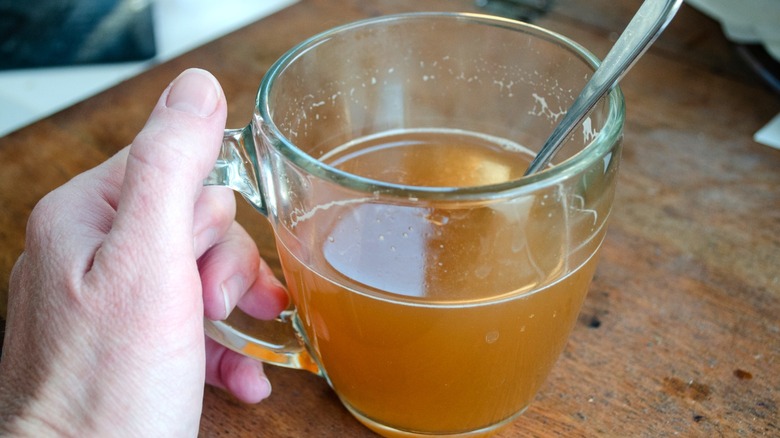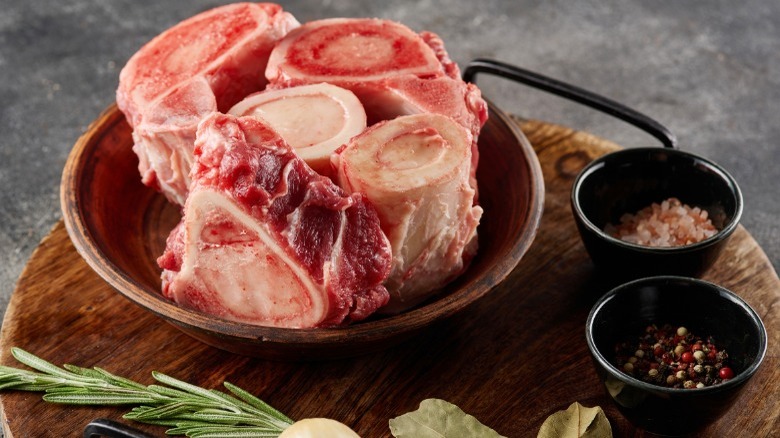What Is The Bone Broth Diet And Does It Help You Lose Weight?
Consuming bone broth for weight loss may be the latest hot trend, but bone broth has actually been a staple in diets and medicine for thousands of years. Before it became a base for many Asian meals, the Chinese used bone broth over two millennia ago for medicinal purposes, as a way to support the kidneys and promote digestive health. The Greek physician Hippocrates also recognized the ability of bone broth to improve digestive problems. By the Middle Ages, chicken soup was prescribed as a remedy for the unwell, a common comfort food many people still turn to today when they're under the weather, per Ossa Organic.
To understand why some people may turn to bone broth for weight loss purposes, though, you should first understand the paleo diet, which has grown in popularity in recent years.
The paleo diet follows the eating patterns of our ancestors who lived millions of years ago. Sometimes referred to as the Stone Age diet or caveman diet, allowable foods can only include what our ancestors could attain through hunting, gathering, and fishing. The theory behind the paleo diet is that today's chronic diseases and rise in obesity are due to the agricultural revolution, which introduced more grains and dairy into human diets, according to the experts at UC Davis Health. However, they note that the paleo diet is primarily best as a starting point, and that following the diet for too long a period may lead to deficiency in some key vitamins and minerals, including calcium.
How the bone broth diet works
For those on the paleo diet, the bone broth diet may fit into your eating approach. Created by naturopathic doctor Kellyann Petrucci, the bone broth diet is a 21-day regimen that integrates two non-consecutive days of bone broth fasting with five days of the paleo diet. The bone broth days act as an intermittent fast, which is offset by the five days of a low-carb diet, according to Healthline.
If you are planning to try the bone broth diet, pick the two days when you will do your bone broth mini fasts, which consist of either 6 eight-ounce portions of bone broth throughout the day or 5 portions of broth and ending the day with a protein snack. For the other five days, your meals should consist of proteins, non-starchy vegetables, and some fat. Following the 21 days, you then shift to a maintenance plan, eating permitted foods 80% of the time. During the other 20% you can include dairy, alcohol, and other treats that are not on the diet plan. Though the bone broth diet is marketed as a quick way to lose up to 15 pounds, Healthline notes that there is minimal research on its effectiveness.
In fact, MedicineNet reports that there are some potential risks with the bone broth diet, including metal toxicity entering your system via the animal bones, and gastrointestinal discomforts such as bloating and constipation. Over time if could also lead to vitamin deficiencies.
How to make your own bone broth
If you decide to give the bone broth diet a whirl, consider making your own bone broth, which may be better than what you'll find in a store and save you money.
Different from stock, which involves simmering bones and herbs for a few hours to serve as a base for a soup, bone broth recipes are designed to extract a high concentration of collagen — which has been linked to reducing wrinkles — protein, and nutrition from the bones and connective tissue of the animals. Bone broth leaves you with a feeling of fullness and also provides ample hydration since bone broth is mostly comprised of water, according to Food Network.
For an Epicurious beef bone broth recipe, you will need four pounds of beef bones, two medium unpeeled carrots, one medium leek, one medium onion, one garlic head, a couple of celery stalks, some black peppercorns, a bit of cider vinegar, and two bay leaves. The essential equipment you will need includes an eight-quart stockpot and a strainer. The recipe advises simmering for longer than eight hours for the tastiest broth. Though this sounds like a long time to wait for bone broth, it's worth it in the end — and you can freeze your delicious creation for up to six months.
For those who are immunocompromised, pregnant, diabetic or have a history of eating disorders, experts strongly advise you to consult your healthcare provider before committing to the bone broth diet.



